Give your household products a “natural” polish with a citric acid cleaner. Find out which household items you can clean with citric acid.
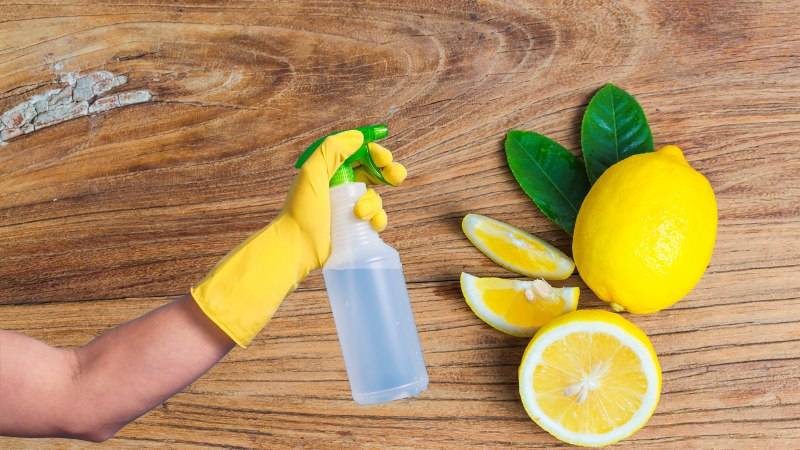
If you've ever looked at the ingredients of modern cleaning products, you'll probably find a scary list of toxic chemicals.
While they might work perfectly fine to get rid of dirt and germs, most of those chemicals end up in our water system, causing serious damage to marine life.
But there is an alternative that every household should consider in the form of citric acid cleaner.
Citric acid powder is one of the most versatile natural cleaning agents that also happens to be one of the most eco-friendly ways to clean your home.
But you have to be careful how and where you use it, as it's not a suitable product for some types of materials.
First, let's take a look at different uses of citric acid powder substitute.
What Is Citric Acid Powder And Why Should You Use Citric Acid Cleaner?
Citric acid powder is an organic acid that is primarily sourced from citrus fruit. You'll also find it in lower concentrations in other fruit and vegetables, but lemons and oranges are the most common source used.
If the term "acid" concerns you, it's important to note that this is a weak acid and is in no way harmful to human health when used in the right way.
In fact, citric acid is commonly used in the food industry, so it's even safe to ingest.
You can even get it from lemon juice!
As a chelating agent, it can bind to metals, and that powerful effect gives us a few excellent citric acid powder uses.
You can easily mix up a citric acid cleaning solution by dissolving the powder in warm water. All you need to do is mix a tablespoon with a pint of water, and you're ready to go for this zero waste cleaning solution.
If you have an empty spray bottle from all-purpose cleaners, then simply fill it with your DIY citric acid cleaner, and you'll be able to use it to clean and disinfect every part of your home.
Let me show you where you should get started.
How To Use A Citric Acid Cleaner At Home
Here are 10 of the best uses for citric acid.
1. Deep-Cleaning Your Kettle And Coffee Pot
This is possibly one of the most common uses for citric acid in households. Your kettle will probably suffer from the biggest build-up of limescale if you have particularly hard water.
You can create magic, though, when you add this ingredient to hot water.
That's when the acid will attack the limescale and completely dissolve it.
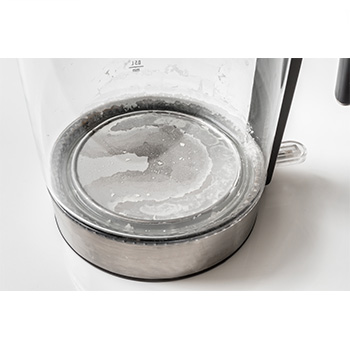
Simply open the top of the kettle and then fill it to the level where you can see hard water stains along the sides. Then add one or two teaspoons of citric acid and bring the kettle or coffee pot to a boil.
Now rinse it out and see if there's still any staining left. You might need to repeat this a couple of times, but it will leave it sparkling clean.
2. Removing Grime And Build Up From Your Dishwasher
Another problem with hard water is that detergents don't fully dissolve in it. This can lead to soap scum building up that can become a breeding ground for bacteria and smells.
And this is where you get another one of the great uses for citric acid.
To fix this problem, simply add two teaspoons of powdered citric acid and one spoon sodium bicarbonate (baking soda) to your dishwasher and then run in a hot cycle.
The citric acid and baking soda will get into every small part of the washing machine that you can't see or get to. It will dissolve and remove soap scum effectively, leaving the inside of the machine perfectly clean.
In hard water homes, aim to do this every 30 cycles, and your machine will last a lot longer.
3. Degunking Your Washing Machine
Your washing machine can suffer the same fate as your dishwasher, but the build-up of limescale and laundry detergents tends to do more damage to a washing machine.
The solution is the same uses for citric acid as your dishwasher.
Two teaspoons of this ingredient and one teaspoon of baking soda in an empty hot cycle every 2 to 4 weeks should do the job.
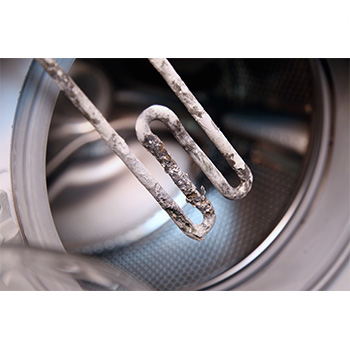
The citric acid and baking soda won't just be effective at removing soap scum but will also attack mineral deposits.
A common fate of washing machines is that the heating element fails because of too much limescale, and this tip will resolve that. Or, you can create your very own DIY washing machine cleaner.
4. Removing Limescale From Your Faucets And Sinks
Most people just buy a spray bottle of limescale remover and never look at the chemicals in it. Not only are they harmful to the environment and possibly your health, but they often don't work as well as citric acid.
One of my favorite uses for citric acid is to keep all the faucets shiny.
To use citric acid for cleaning all the sinks and faucets in your home, just mix up two tablespoons of it with warm water in a pint of warm water. Fill it into a spray bottle, and you're good to go.
Spray it on the faucets and sinks and let it work for 20 seconds before wiping away any limescale build-up.
5. Getting Rid Of Hard Water Stains From Your Toilet Bowl
Your toilet bowl is another area where you'll notice a gradual build-up of water stains. No matter how hard you scrub, they seem to be impossible to remove.
To remove these stains, use the same mix as for your faucets and spray it onto the toilet bowl every time you clean it. If the stained areas in the toilet bowl don't seem to come away easily, then you might need to clean with citric acid in a stronger solution.
One of the uses for citric acid I recommend for heavy staining or mineral build-up is to double or triple the strength of the citric acid solution for those tough areas.
Once it's clean, simply keep using the regular solution every week, and you won't have this problem again.
6. Disinfecting surface areas in your home
Citric acid is also a potent antimicrobial, so you should favor this green cleaner for other areas in your home like kitchen counters, tables, or other surfaces where you eat or prepare food.
To disinfect those surfaces in your home, simply mix a few spoonful of it with warm water in a spray bottle, add a few drops of essential oils, and your home will smell as clean as it is.
It's one of those uses for citric acid that can deep clean your home and leave it smelling naturally fresh without any danger from chemicals.
7. Polish Up Stainless Steel Equipment And Surfaces
This is another one of the great uses for citric acid that most people don't think of.
If you have some stainless steel surfaces and kitchen appliances, then you'll inevitably splash them with hot water leaving some hard water deposits.
Those mineral deposits are ugly, and with many chemical limescale removers, you might end up doing damage to the stainless steel surface.
Instead, spray on some citric acid cleaner and use a microfiber cloth to polish it.
It's a non-toxic polish that will leave things shining.
Go ahead and try it on your refrigerator surface and see for yourself!
9. Deep Clean Toaster Oven Racks
Here is another one of the great uses for citric acid. When hot water and dish soap won't do the job of fully cleaning your toaster oven racks, then don't resort to using specialty chemical cleaning products. Instead, choose a green cleaning product.
Leave the racks to soak in hot water and citric acid for an hour, and then use some steel wool to scrub them clean.
The acid should gradually attack the carbonized food, making this an effective cleaner for even the most hated cleaning jobs.
If this is something you haven't done in a long time, then you may need to repeat the process a few times.
8. Descale Hot Water Heater
Hard water deposits don't just build up in your coffee pot and kettle.
Over the years, they will build up in a hot water heater, and it will become less effective and possibly even break down.
And one of the uses for citric acid is to clean out your hot water heater, but it takes a bit more effort.
First of all, plan this for a day where you won't need the hot water heater for several hours.
Add ten ounces of citric acid to the cold water inlet and let it sink to the bottom, and dissolve.
Then heat the water and let the acid do its magic on the mineral deposits for 4-8 hours before completely draining the tank.
10. Clean Showerheads
And the final one of my recommended uses for citric acid is to remove limescale and calcium deposits from showerheads.
If you notice that some of the small nozzles on the shower head don't spray water anymore, then remove the showerhead and place it in a bowl.
Pour a teaspoon of citric acid into the showerhead, and then slowly fill the bowl with hot water.
Leave it to soak for an hour and then rinse it out with cold water, and it should be looking like new again.
5 Best Citric Acid Cleaning Products
If you want to use a natural cleaner to degunk and disinfect your household items but you don't want to sacrifice your lemons to the cause (because lemonade is amazing), then you should get these products instead. All of them have citric acid — meaning you can have your lemon and eat it too.
1. Citra Solv Natural Cleaner & Degreaser Concentrate
This is one of the most concentrated natural green cleaners available in the market today. It allows for countless uses in pure or diluted form to clean practically every part of your house.
People also love the fresh smell of citrus fruits that it leaves behind.
The main advantage is that you don't have to dissolve the citric acid powder and try to figure out the ideal concentration. I've used it for cleaning everything from my floors to the BBQ grill, and the small bottle seems to last for a very long time.
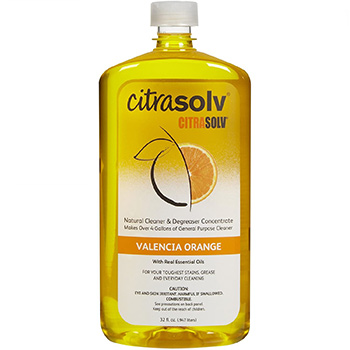
2. Milliard 100% Citric Acid
If you prefer mixing up your own concentrate, Milliard provides you with perfectly fine granules to make it easier to dissolve.
It comes in a large 10-pound bag, so you'll have enough citric acid to keep you going for many months, even if you have a large home to keep clean.
I also put a scoop of this in my washing machine every two weeks; despite having very hard water, the heating element stays limescale-free.
It's also a food-grade product, so you could use it as a flavoring for homemade ice cream or candy.
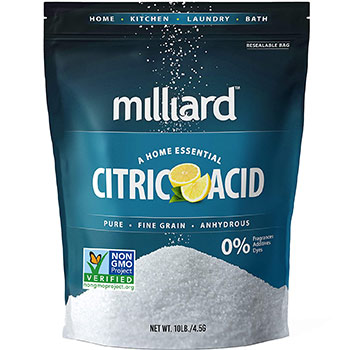
3. Pure Organic Ingredients Citric Acid
This Pure product is possibly one of the finer grain citric acids available. The benefit of this is that it's easier to apply directly to tough limescale and gently lift the stains. You can even make a paste by mixing it with baking soda and just a few drops of water.
Also, as it's organically sourced, it would provide added peace of mind if you plan to use it in food.
It's ideal for making homemade ice cream, cakes, and candy. Because it's such a fine powder, you won't have to worry about it properly mixing with the food.
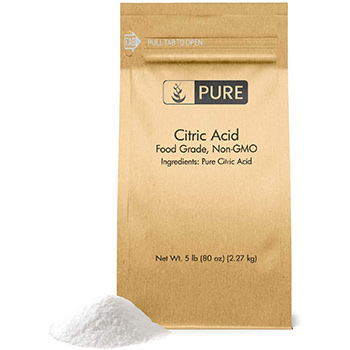
4. Lemi Shine Complete Dishwasher Bundle
I love these Lemi Shine products as they come in four different containers at different concentrations.
Simply pick one of the products depending on whether you need to deep clean one of your appliances or just want to add some extra sparkle to your glasses in the dishwasher.
They come in convenient pods and will work wonders to cut through dirt and grime that builds up over time.
I simply set a reminder on my phone to put one of these in an appliance every two weeks, and they always stay fresh and clean-smelling.
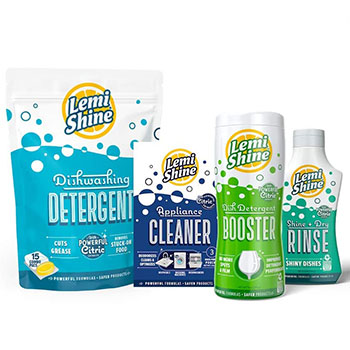
5. Halefresh Citric Acid
There are no unnecessary added anti-caking agents that might otherwise make it less effective. Simply mix it with warm water and essential oils, and enjoy the fresh smell it leaves behind.
I also find the pouch very convenient as it takes up less space on my cleaning product shelf in the pantry. And unlike other pouches, the seal closes perfectly every time to keep the granules dry and ready to use.
You can even use it for preserving or preparing food so let your imagination go with this citric acid.
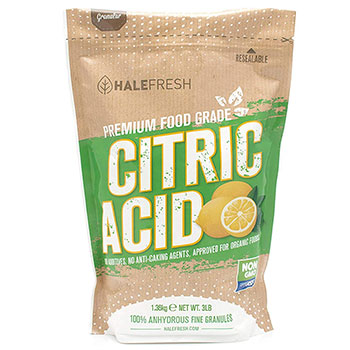
Most people just buy a spray bottle of limescale remover and never look at the chemicals in it. Not only are they harmful to the environment and possibly your health, but they often don’t work as well as citric acid.
What NOT To Clean With Citric Acid
To avoid destroying certain surfaces in your home, I would advise keeping this acid away from any natural stone. This would include unsealed stone tiles, marble or quartz countertops, and any kind of outside paving.
You should do the same thing with brass faucets, ornaments, or antiques — don't get citric acid near them. It's likely to cause staining that you can't remove.
Here is a list of things you should avoid using your citric acid solution on:
And if you're ever in doubt, try to use a small amount on a concealed part of a surface to see if there's a negative result.
FAQ
Yes, citric acid is safe for cleaning. The extract from lemon juice is 100% natural and practically harmless to humans and the environment. If you clean with citric acid, then you’ll still have the peace of mind that you have effectively dealt with germs.
Yes, you can mix citric acid and vinegar, but it might be unnecessary. They both contain acids, but citric acid is more effective at dealing with limescale. Some folks also don’t like the smell of vinegar, preferring the fresh citrus scents.
Yes, citric acid is antibacterial and effectively deals with the most common household germs. It does this in a completely natural way where the acid attacks the outer membrane of bacteria and completely breaks them up.
Yes, citric acid can bleach clothes in high concentration. It’s not as potent as standard bleach, but you may want to be careful while cleaning. If you mix up a high concentration to deal with tough stains, then try to avoid contact with your clothes.
No, citric acid isn’t stronger than vinegar. The acetic acid in vinegar is a lot more aggressive and corrosive when it comes in contact with certain surfaces. But, there are many types of mineral deposits that citric acid can better deal with.
Yes, you can mix baking soda and citric acid, which is an effective combination for dealing with detergent deposits in appliances. The general recommendation is to aim for a 2:1 mix.
Yes, you can mix borax and citric acid. Some folks believe this is one of the best combinations for cleaning toilets.
Final Thoughts
If you want to take some extra steps towards protecting our environment, especially marine life, try using a citric acid cleaner in your home.
It has been scientifically proven to kill germs and do so without any potential risk to you or your family.
The refreshing smell of citric acid powder is also far more natural than anything you'll find in those chemical products you see at the store.
Check out any of the above-recommended products today and see for yourself how much cleaner your home will be at a fraction of the price of conventional cleaning products.

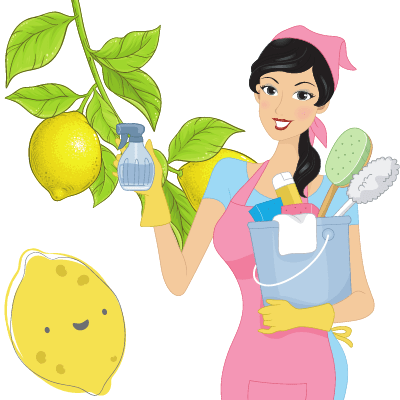
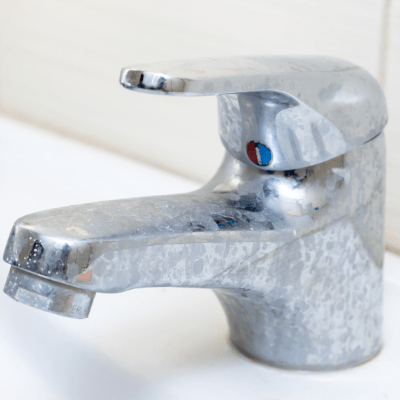
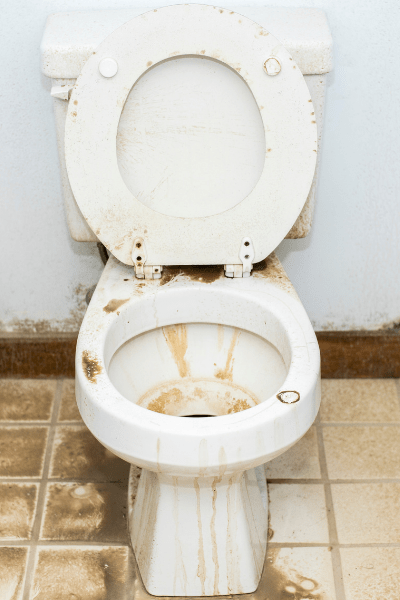
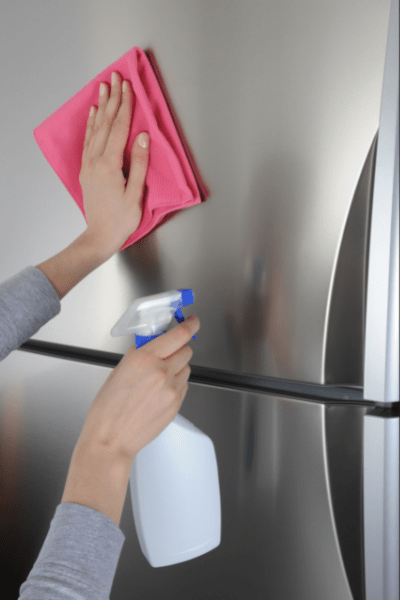
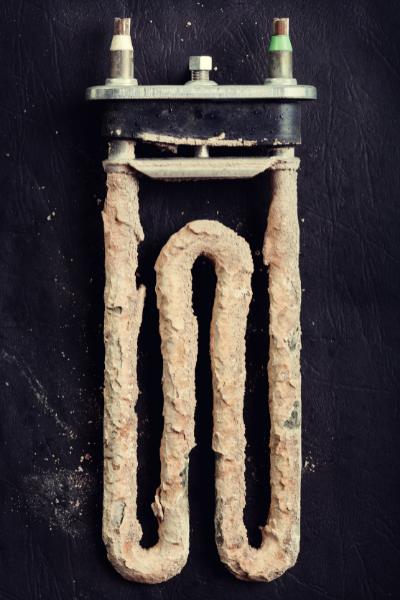


I found this article on citric acid cleaner to be really informative! The benefits of using citric acid as a natural cleaning agent and the DIY recipes provided are great. Thanks for sharing this eco-friendly cleaning solution!
Thank you. Please share with all your friends.
Citra-Solv is limonene, not citric acid. And while its naturally derived, it is WILDLY TOXIC to fish and wildlife – it is a biocide – so please dont go rinsing it down your drains and into the water table! Use it like you would any paint solvent, and dispose it by pouring it over some stones in a pail or some cat litter and then let it evaporate outside. Once evaporated or dried out, you can then toss the cat litter.
Is citric acid safe to wash colored clothes? I know it has bleaching properties, but if I use a small amount in my laundry to remove build up from fabric softeners and hard water can I use it on all my clothes?
Pingback: What are the Ingredients in Keurig Descaling Solution? (2022)
Pingback: 3 Ways To Get Coffee Flavor Out Of Your Thermos – Trung Nguyen
Hi,
I tried mixing my own 5% citric acid by weight by dissolving the store bought citric acid powder in water. I found that it leaves a whitish film on surfaces after being wiped down. Any idea what this film is, and if there is anything I can add to the solution to make it not stain?
Thank you,
Zack
Use Distilled water to mix with your citric acid.
With regard to using baking soda or any ingredient that is base, from basic chemistry, one immediately neutralizes the solution.
Mixing those two with water all you’ll get is basically a slightly salty water.
If one wants to use the two because they do provide different effective cleaning objectives, use them separately. First make a baking soda paste, make sure you complete clean/remove that paste. Then use the acid solution.
Doing that will actually work…
Can I use citric acid to clean a jetted soaking tub? We just bought a home (15 years old) with a jetted tub and I want to sanitize the jets.
GreenCitizen is an environmental conservation company providing you with information, services, and products to help you live a sustainable life.
Follow Us
Join Our Newsletter
Quick Links
Green News
Green Directory
Green Store
Blogs
Most Popular
Sustainable Living
Renewable Energy
Business & Polices
Environment
Product Review
Services(United States)
For Businesses
Business Pickups
Data Destruction
Build Wide Pickups
Product Destruction
For Homes
Electronics Recycling Drop-off
Mail-in Recycling
Hard Disk Destruction
How to Recycle ?
Useful Links
About Us
Contact
Careers
Customer Reviews
Our Customers
Press Room
In The News
LEED Reporting
E-waste Crisis
Data Security
Global Dumping
Harmful Effects
Styrofoam Recycling
Polyurethane Foam Recycling
Why Data Security ?
Copyright © 2023 · All Rights Reserved · GreenCitizen
Privacy Policy | Affiliate Disclosure